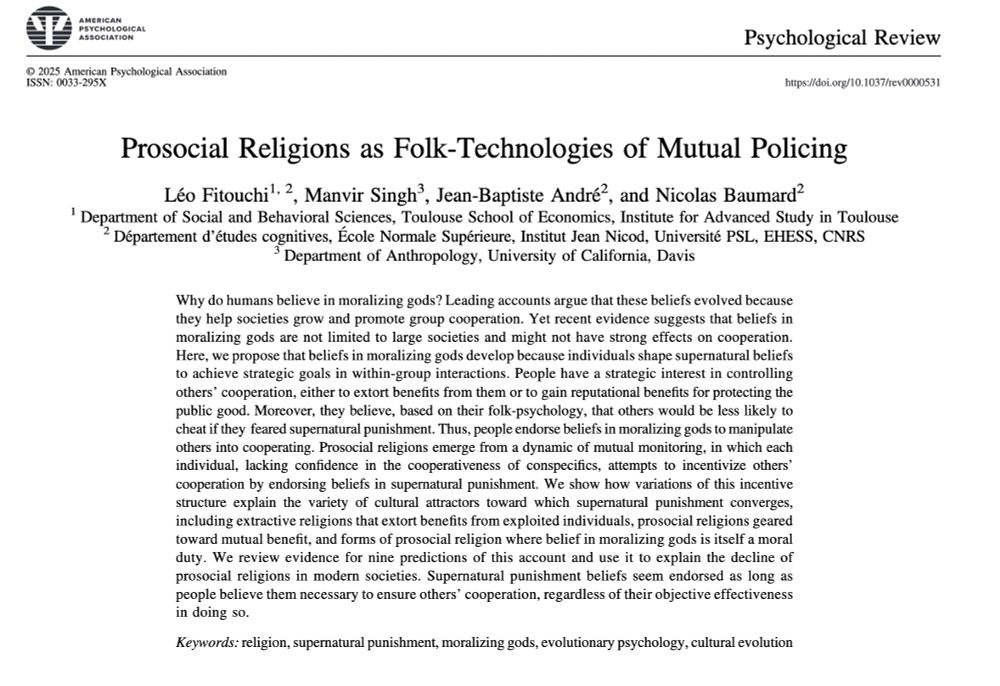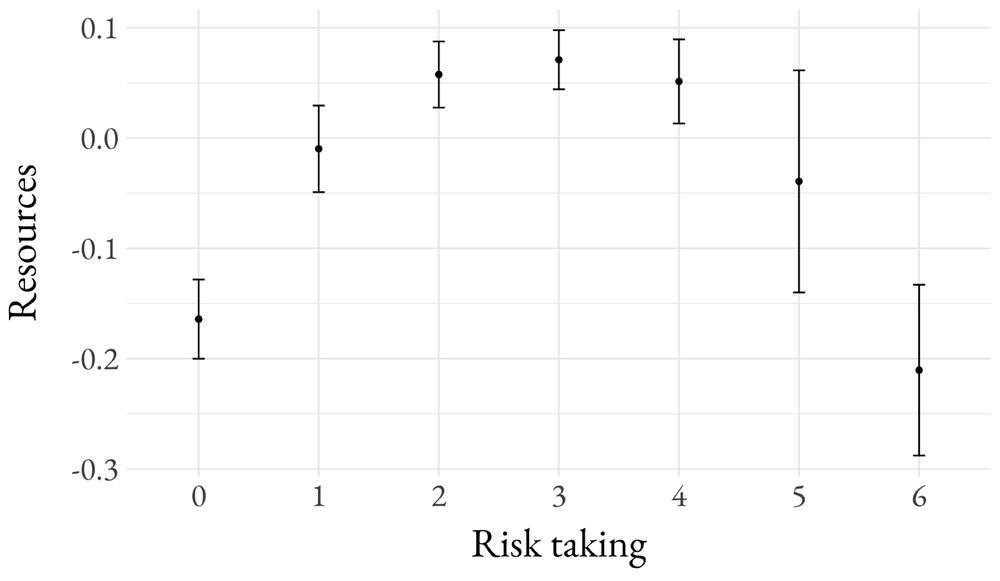We outline some work done by our team and by others on the topic. We cover things like, why ecospirituality might be so prevalent around the world; how it might shape sustainable behavior through activating moral cognitions; and how being particularly connected with nature might benefit well-being.
02.09.2025 20:03 — 👍 0 🔁 0 💬 0 📌 0

Ecospirituality - Matthew I. Billet, Adam Baimel, Mark Schaller, Ara Norenzayan, 2025
Many people in many cultures have a spiritual connection with nature. Research is beginning to reveal the implications of this “ecospiritual” orientation for tw...
Interested in the psychology of people's spiritual connections with nature, and how it shapes well-being and sustainable behavior?
Check out my open-access Current Directions article with Adam Baimel (@abaimel.bsky.social), Mark Schaller, and Ara Norenzayan: journals.sagepub.com/doi/full/10....
02.09.2025 20:02 — 👍 0 🔁 0 💬 1 📌 0

How religion declines around the world
A country’s religious affiliation tends to decline in three transitional stages that unfold across generations, a new paper using Center data proposes.
Below is my new post about our Three Stages of Religious Decline paper (www.nature.com/articles/s41...).
We argue that a similar process of decline affects countries on every populated continent, including countries in which Christianity, Islam, Buddhism or Hinduism is the largest religion.
A🧵
02.09.2025 17:15 — 👍 83 🔁 34 💬 11 📌 5

Kombucha girl maybe meme.
On the left, frowny face: working on an important manuscript
On the right, intrigued: spending two hours to create a figure that came to my mind quite randomly
08.04.2025 14:27 — 👍 271 🔁 26 💬 16 📌 12

ACE Lab: Applied Cultural Evolution Laboratory
culture, evolution, cooperation, and sustainability
Fully-funded PhD position on the cultural evolution of environmental management!
Link evolution, ecology and behavioral science in the ACE Lab timwaring.info Details: forms.gle/gZWK9BpwYfoG...
@culturalevolsoc.bsky.social @alexmesoudi.com @hyperadapthyrax.bsky.social @michael.muthukrishna.com
10.03.2025 13:01 — 👍 34 🔁 31 💬 1 📌 2
The Sources of Researcher Variation in Economics
We use a rigorous three-stage many-analysts design to assess how different researcher decisions—specifically data cleaning, research design, and the interpretat
After a long wait, the working paper for the Many-Economists Project: The Sources of Researcher Variation in Economics. We had 146 teams perform the same research three times, each time with less freedom. What source of freedom leads to different choices and results? papers.ssrn.com/sol3/papers....
25.02.2025 19:17 — 👍 347 🔁 162 💬 12 📌 41

The New Science of Ecospirituality
How can we sustain both our planet and ourselves? The new science of ecospirituality has some ideas and some suggestions to try.
How can we sustain both our planet and ourselves? Drawing on a new review of research by @matthewibillet.bsky.social, @abaimel.bsky.social, and colleagues - as well as faith and climate scientist leaders like @katharinehayhoe.com, my article for @psychologytoday.com explores what we can do.
24.02.2025 15:55 — 👍 12 🔁 4 💬 0 📌 1

Where do moralizing religions come from? Useless cognitive by-products?Cultural group selection for complex societies?
Our Psych Review paper argues: neither. Let’s rethink their cognitive & evolutionary origins🧵
w/ @manvir.bsky.social @nbaumard @jbaptistandre.bsky.social
doi.org/10.1037/rev0...
11.02.2025 18:20 — 👍 82 🔁 40 💬 6 📌 2

Does poverty lead to risk taking or risk avoidance? Turns out, to both. Our new paper (with D. Nettle & W. Frankenhuis) in @royalsocietypublishing.org explains why, and conducts preregistered tests of our ‘desperation threshold’ model.
royalsocietypublishing.org/doi/10.1098/...
A 🧵
07.02.2025 14:12 — 👍 26 🔁 15 💬 1 📌 1

Critical comms about climate change is increasingly happening on social media. But it is challenging to study climate comms on popular social media platforms, so researchers often rely on survey research. How much do survey responses tell us how things will play out on social media? Thread 🧵
06.02.2025 15:05 — 👍 15 🔁 7 💬 6 📌 1

Does anyone have recommendations for more recent textbooks on environmental psych / conservation psych? I love this one by Gardner and Stern, but it's quite outdated now. #APA34 #environmentalpsych #conservationpsych #sustainability
30.01.2025 02:03 — 👍 0 🔁 0 💬 0 📌 0
Check out our new article on ecospirituality!
Takeaways: Ecospirituality is associated with environmental concern and well-being, and changes in ecospirituality are associated with changes in these variables too! (plus a large pre-registered outdoor experiment that kinda failed!)
28.01.2025 21:25 — 👍 1 🔁 1 💬 0 📌 0
Super interesting - another great article from Gordon Hodson
27.01.2025 06:04 — 👍 0 🔁 0 💬 0 📌 0
how this ideational response to external threats (compared to others, like seeing the threat as part of an apocalyptic prophecy) mediates the kinds of responses a cultural group will have to those threats. 2/2
17.12.2024 16:38 — 👍 1 🔁 0 💬 0 📌 0
Very interesting results in this new meta-analysis of why people turn to conspiratorial thinking. Conspiratorial thinking is a response to external threats, not really a trait of specific kinds of people. I want to know... 1/2
17.12.2024 16:38 — 👍 0 🔁 0 💬 1 📌 0
...We haven't treated childhood experiences as a separate psychological construct - maybe it could help build empathy and good faith across the political divide, especially given that liberals and conservatives both care about leaving a better world for future generations. 13/13
12.12.2024 18:05 — 👍 1 🔁 0 💬 0 📌 0
One interesting finding of this analysis is that childhood experiences in nature come out as an empirically distinct factor from other positive experiences in nature (instrumental benefits factor)... 12/n
12.12.2024 18:04 — 👍 1 🔁 0 💬 1 📌 0
...I suspect other processes are directly polarizing environmental attitudes. Other research suggests partisan news media is likely a major factor here. Pure speculation - I think partisan news media less so affects environmental motives than specific attitudes about climate change and policy. 11/n
12.12.2024 18:03 — 👍 1 🔁 0 💬 1 📌 0
These results seem to suggest that liberals and conservatives differ to a small degree in their environmental motives and that these differences account for some of the broader political differences observed in the literature, but... 10/n
12.12.2024 18:02 — 👍 1 🔁 0 💬 1 📌 0

To some extent they did. When including our environmental motives in a regression predicting preservation and utilization attitudes, it reduced the relationship between political affiliation and attitudes by about half (β=−0.96 to −0.64 for preservation and β = 0.65 to 0.32 for utilization). 9/n
12.12.2024 18:00 — 👍 1 🔁 0 💬 1 📌 0
We wanted to know if differences in these environmental motives might explain some of the broader political differences in environmental attitudes found in the literature. Primarily in preservation and utilization attitudes (see Milfont & Duckitt, 2010). 8/n
12.12.2024 17:58 — 👍 1 🔁 0 💬 1 📌 0
...Responsibility to nature, instrumental benefits from nature, childhood experiences in nature, and religious stewardship over nature. Liberals and conservatives ranked these motives in a similar manner, but differed in their mean endorsement of some of them. 7/n
12.12.2024 17:55 — 👍 1 🔁 0 💬 1 📌 0

In Study 2 we made a battery of self-report items that capture the wide variety of themes liberals and conservatives wrote about in Study 1. Then we subjected these items to factor analysis. We recovered 4 latent factors... 6/n
12.12.2024 17:54 — 👍 1 🔁 0 💬 1 📌 0
Multiple topics represented some themes—some of these topics differed between groups, but not consistently. Anyways, this approach was messy empirically and conceptually (there were multiple themes tapping into "positive experiences in nature" - should we really treat them as separate motives?) 5/n
12.12.2024 17:53 — 👍 1 🔁 0 💬 1 📌 0

We even found overlap in the most frequently discussed motives: Preserving nature because our survival depends on it, for the welfare of future generations, and because nature's beauty is valuable. (Figure 1). 4/n
12.12.2024 17:50 — 👍 1 🔁 0 💬 1 📌 0
Predictably, liberals wrote more about climate change and conservatives wrote more about having a religious ethic to be stewards of nature. But when we looked at the broad spectrum of reasons people discussed, we found a lot of overlap. 3/n
12.12.2024 17:48 — 👍 3 🔁 0 💬 1 📌 0
We first asked over 1500 Americans to write about why nature is worth preserving. We used structural topic modelling to extract the latent themes in their responses and compare the relative prevalence of each theme among liberals and conservatives. (Study 1) 2/n
12.12.2024 17:47 — 👍 1 🔁 0 💬 1 📌 0


New open access article assessing the common ground between liberals and conservatives on why nature is worth preserving. Turns out they share a lot in common!
I did this work with Adam Baimel (@abaimel.bsky.social ), Taciano Milfont, and Ara Norenzayan. 1/n
journals.sagepub.com/doi/10.1177/...
12.12.2024 17:44 — 👍 21 🔁 10 💬 3 📌 0
@njsgibson.bsky.social could you add me as well. Thanks!
04.12.2024 01:12 — 👍 1 🔁 0 💬 1 📌 0
This year’s Cultural Evolution Society (CES) Conference 2026 will be held at UM6P Rabat Campus - Morocco.
Cultural evolution - Cognitive Science - Cognitive Anthropology. Assistant Professor of Organizational Behavior at Stanford GSB. Formerly postdoc fellow at the Santa Fe Institute.
Exploring world in sounds.
PhDing at MPI for Human Cognitive and Brain Sciences (Leipzig) &
MPI for Empirical Aesthetics (Frankfurt)
Former intern at Deezer Research (Paris)
www.harinlee.info
Building personalized Bluesky feeds for academics! Pin Paper Skygest, which serves posts about papers from accounts you're following: https://bsky.app/profile/paper-feed.bsky.social/feed/preprintdigest. By @sjgreenwood.bsky.social and @nkgarg.bsky.social
Psychology Professor, specializing in the psychology of well-being, religion, and spirituality.
🌐 andytix.com
🌐 psychologytoday.com/us/blog/the-pursuit-peace
Technically an anthropologist. Postdoc at the Data Diversity Lab, University of Arizona. Building a database of animal cultures.
https://kiranbasava.weebly.com/
Transforming the Field of Cultural Evolution. Funding by @templeton_fdn through @CulturalEvolSoc.bsky.social
https://mas.to/@CulturalEvolFunding
https://twitter.com/CultEvolFunding
ces.transformationfund@durham.ac.uk
https://ces-transformationfund.org/
Associate Professor in Mathematics interested in cultural evolution and connecting psychology, sociology and philosophy through modelling.
Professor at Wharton, studying AI and its implications for education, entrepreneurship, and work. Author of Co-Intelligence.
Book: https://a.co/d/bC2kSj1
Substack: https://www.oneusefulthing.org/
Web: https://mgmt.wharton.upenn.edu/profile/emollick
Home of the "Best of #Econtwitter" (& #econsky) newsletter
https://www.bestofecontwitter.com/
An open access, open science psychology journal from @ucpress.bsky.social, and the official journal of @improvingpsych.org (SIPS). Editor-in-Chief: @donvanraven.bsky.social
https://online.ucpress.edu/collabra
Assistant Professor of Sociology, NYU. Core Faculty, CSMaP. Research Fellow Oxford Sociology. Computational social science, Methods, Conflict, Communication. Webpage: cjbarrie.com
Research Associate @COSPIRACY_FX @KentPsychology @UniKent. Studying Misinformation | Conspiracy Beliefs | Political Psychology (he/him).
Turning faces into numbers and numbers into insights 🤓📊
Postdoc fellow researching cultural evolution at the Institute for Advanced Computational Science - Electronic music as Callosum - masonyoungblood.com
Prof at UniMelb. I'm a computational cognitive scientist studying human inference, learning, information systems, culture, and (mis/dis)info. Nerd & opinionated loudmouth in Oz, originally from America, citizen of both. Parent of two. 🏳️⚧️ perfors.net
Investigating mitigation strategies that limit future climate change, eg. afforestation, methane reductions & net-zero pathways net-zero
https://terrafirma.ac.uk/
Metascience, statistics, psychology, philosophy of science. Eindhoven University of Technology, The Netherlands. Omnia probate. 🇪🇺












